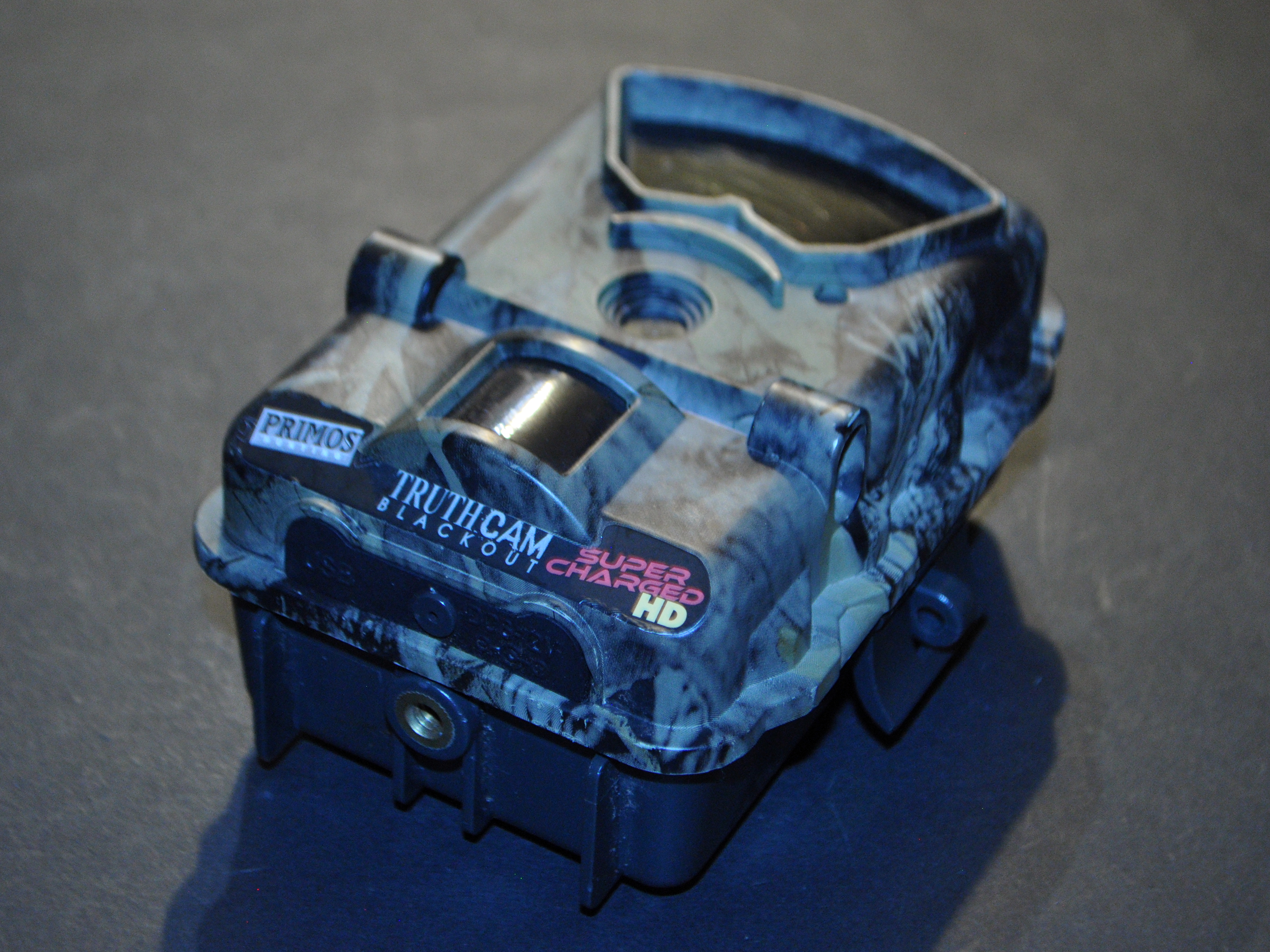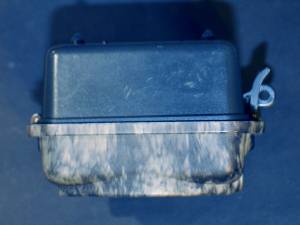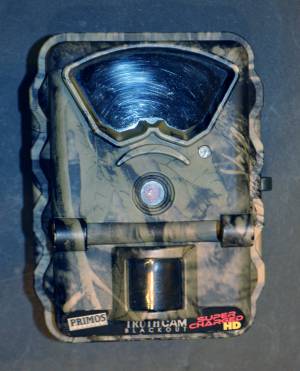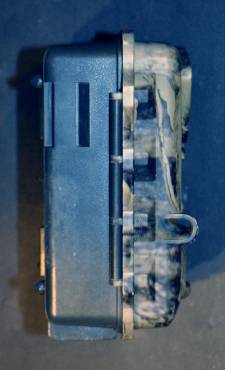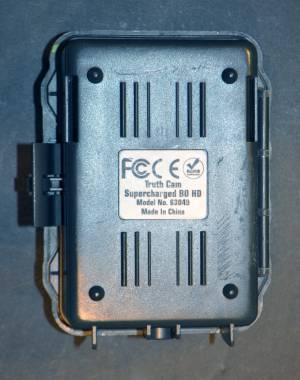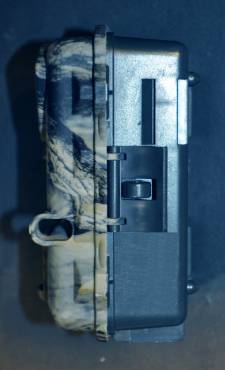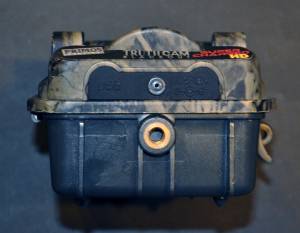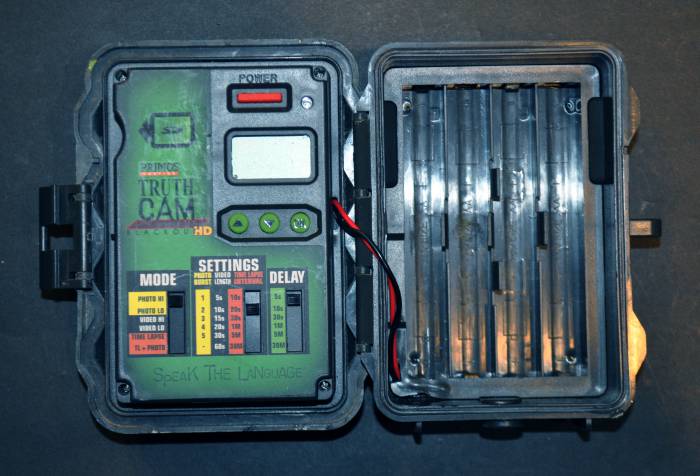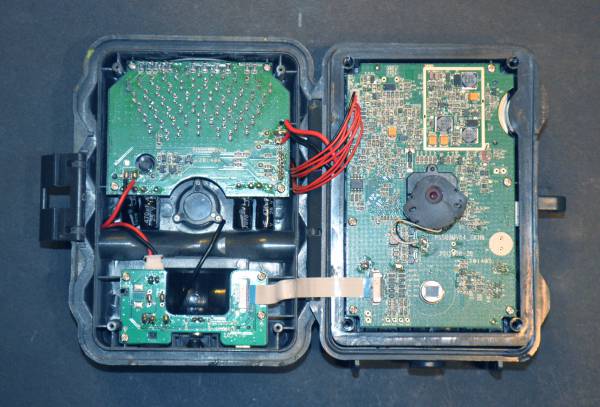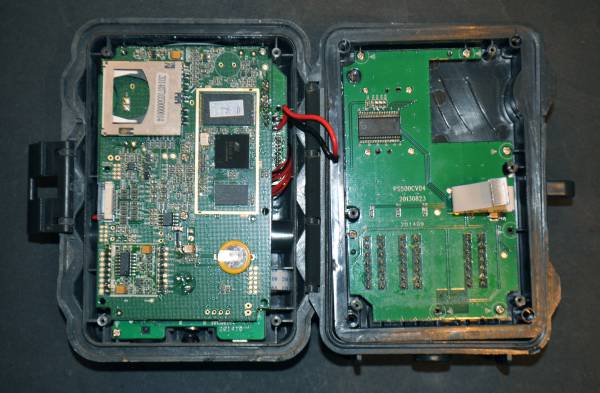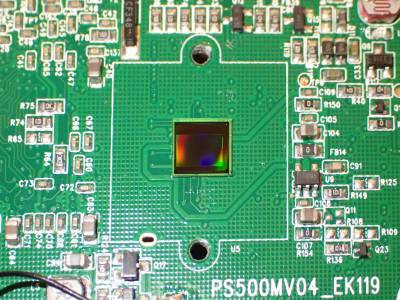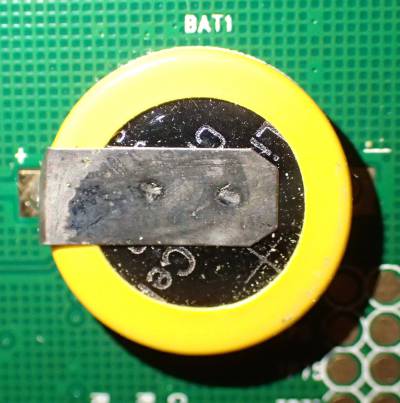User Tools
Site Tools
Published 27 Jun 2023
Primos 63049
Overview
| Camera data | |
|---|---|
| Model | Primos Truth Cam Supercharged HD 63049 |
| Manufacturer | Primos |
| Board IDs | PS500MV04_EK119, PS500DCV04, PS500LED60V04, PS500CV04 |
| Type | TrailCam |
| Memory card | SD |
| Date | 2014 |
The Primos 63049 is a Trail-cam/Scouting camera/Game camera/Surveillance camera with night vision capability.
Designed for monitoring wildlife or security/surveillance it is reasonably weatherproof. The case is coloured camouflage green. Unlike many trail cameras this one records sound in its two video recording modes. It also has the advantage that, as it can run off 6V, it is happy to utilise NiMh rechargeable batteries that are often a problem in trail cameras as their output voltage is lower than other AA cells. For me it has one disadvantage, it does not have a record 'photo plus video' option (I often want a high res photo, plus the action video).
Hardware description
ThePrimos 63049 has a 5 Megapixel camera, and one passive infrared sensor.
Described as a 7MP camera in advertising, yet it is also described as only having a 5MP sensor. So presumably the extra inserted pixels in the 3072 x 2304 images are interpolated (ie average of adjacent pixels) - ie literally a waste of space on your SD card just for marketing hype and actually a degradation of picture quality.
| Feature | Specifications |
|---|---|
| Lens | F = 3.0; FOV = 55°; Auto IR cutout, 7.5mm |
| Image sensor | 5 Megapixel colour CMOS |
| ISO sensitivity | 100 |
| Image size | 3072 x 2304, 2592 x 1944 |
| Video size | 1280 x 720 at 30fps, 320 x 240 at 30fps |
| IR flash range | 16 m |
| LCD screen | 1.1” Character LCD |
| Memory SD card | Up to 32 GB, preferably HC 10 speed |
| PIR sensitivity | Auto |
| PIR sensing distance | |
| Prep PIR sensing angle | |
| Main PIR sensing angle | 45° |
| Operation mode | Day/Night |
| Trigger delay | 1 sec |
| reTrigger interval | 5s, 10s, 30s, 1m, 5m, 30m |
| Still photos | 1 to 5 |
| Video length | 5s, 10s, 15s, 20s, 30s, 60s |
| Photo plus video option | no |
| Sound plus video | yes |
| Time lapse capture | 10s, 20s, 30s, 1m, 5m, 30m |
| Time lapse plus photo | yes |
| Time stamp | Moon Phase, Temperature (°F,ºC), Date, Day of Week, Time |
| Time stamp videos | Moon Phase, Date, Time |
| Password | - |
| Device ID setting | - |
| Power supply | 8 x AA. Or external 6V-12V DC |
| Stand by current | 250 µA |
| Stand by time | |
| Power saving | - |
| Power consumption | 90 mA (+1100 mA when IR LEDs fire) |
Components
- EK112 9, Hr14089600
- M8SF1X29RQ1
- Hynix H5PS5162GFR, Y5C 421AA, NWKH3551HA7
- SJ25-I/SL, F091415B4T
- NXP 8563T
- Holtek HT1621B, B410N0162G8
Opening the cover reveals the battery compartment, on/off switch., status LCD, select buttons, SD card socket, and mode select slide switches. The external power socket (2mm barrel socket), microphone and USB port are located on the bottom.
Operation
When initially powered on the photo count can be seen (or “Add50”, meaning “Add SD”, if no card is installed), and the battery charge level is displayed. The date and time can be set using the up and down buttons, and 'ok' to confirm. Simultaneously holding down the up and down buttons for 2 seconds formats the SD card without asking for confirmation. After a no-activity time-out of 10 seconds it does a 15 second countdown until it is armed and ready to take photos. While the cover is open a green light can be seen whenever it is writing to the SD card.
The first slide switch selects between six different operating modes, and for each mode the second slide switch selects options:
- High and low resolution motion activated photographs,
- Photo burst length 1,2,3,4,5,-.
- High and low resolution motion activated videos,
- Video length 5s, 10s, 15s, 20s, 30s, 60s.
- Time lapse with or without motion activated photographs,
- Time lapse interval 10s, 20s, 30s, 1m, 5m, 30m.
the third slide switch selects the re-trigger delay (delay before it will trigger again after having taken a photo or video):
- 5s, 10s, 30s, 1m, 5m, 30m.
I'm not sure what the difference between the burst length setting of “5” and ”-” is. When set to ”-” it appears to operate the same as “5” and take a burst of 5 photographs over a couple of seconds.
The re-trigger delay is the period between the trigger event that initiates the first photo of the burst and the next burst. So as it takes a couple of seconds to take a long burst, there may be only a short interval between the end of the first burst and the start of the next.
In the time lapse plus motion photograph option, it takes three “low” resolution photographs and then waits the re-trigger interval before triggering on motion again.
As noted in the section above the “low” resolution photographs are just the native resolution of the camera, the “high” resolution photographs are just the same but packed out with interpolated pixels, which adds nothing but size and softens/blurs the image slightly.
Examples
Tear down
Remove the batteries and SD card before disassembly. The back-panel is held on by 4 screws, and opens out to reveal the IrLED, power, microphone and USB circuit boards on one side, and the camera and sensor circuit board on the other:
The camera board is held down by a further 5 screws, and once removed (and connecting PCB flex cable carefully disconnected) we can see the back of the camera board with its SD card socket and backup battery and the LCD and switch board that was underneath:
The camera lens can be removed, revealing the camera sensor mounted directly on the PCB:
A rechargeable battery powers the clock while the batteries are being changed or are dead:
References and Additional Resources
Page Tools
 Except where otherwise noted, content on this wiki is licensed under the following license: CC Attribution-Share Alike 3.0 Unported
Except where otherwise noted, content on this wiki is licensed under the following license: CC Attribution-Share Alike 3.0 Unported
